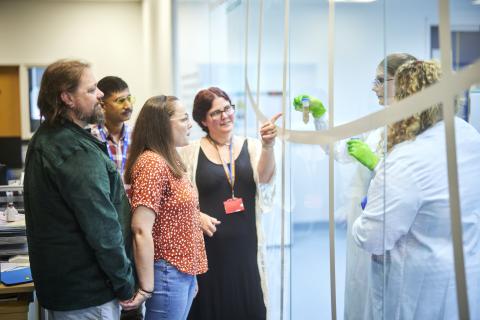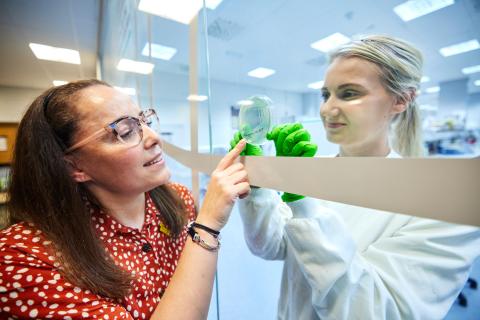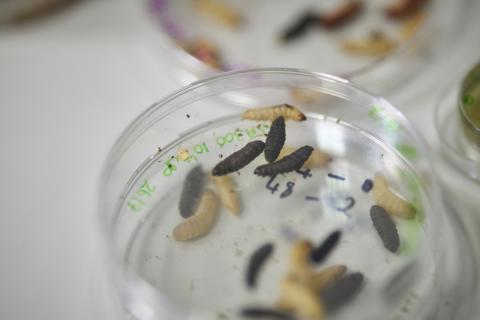The other side of the window - Sarah’s visit to labs researching CF lung infections
What does antimicrobial resistance mean for people with CF?
As bugs that cause infections adapt and change, they may become resistant to antimicrobial medicines, meaning that medicines aren't as effective or no longer work as a treatment. This is known as antimicrobial resistance (AMR).
Though AMR is a threat to everyone, people with CF need access to effective medicines to treat lung infections, both for those able and unable to benefit from CFTR modulator medicines such as Kaftrio. New medicines to treat CF lung infections are urgently needed to overcome AMR.
Reducing AMR was one of the top CF research priorities identified last year.
Developing new ways to test CF antimicrobial medicines
In the summer, we invited Sarah and her husband, Stephen, to visit the CF research labs of Professor Jo Fothergill at Liverpool University. Jo leads a Strategic Research Centre programme co-funded by Cystic Fibrosis Trust and CF Foundation in the United States.
The aim of the SRC is to make it easier for researchers to develop new antibiotics specifically designed to treat CF lung infections. They will do this by creating and checking new methods to test the effectiveness of new medicines. When ready, these tests could be used by university and industry-based researchers around the world to help them develop new medicines.

As they use CF infection-causing bacteria in the labs, for Sarah’s health and safety, she wasn’t able to go into the lab itself. However, Sarah and Stephen were able to view it from offices next door, where there was a floor-to-ceiling glass window that looked into the lab. Members of Jo’s lab were able to bring parts of their experiments up to the window, and Jo was able to explain what the studies were about and why they mattered.

Bugs growing on an agar plate
Hollie Leighton, PhD student in Jo’s lab showing Sarah some agar plates. Agar is a jelly-like substance that researchers use to grow and study bugs in the lab. Growing bugs on shallow, flat plastic lab dishes known as ‘plates’ containing an agar solution is a good way to understand how the bugs grow and what they eat!

Synthetic sputum
To develop a medicine to treat bacteria growing in sputum in the lungs of someone with CF, researchers need to test new medicines in sputum, too. Researchers have created recipes for ‘synthetic sputum’. It is important to compare how bugs grow in different synthetic sputum and to the ‘real’ thing!

Maggots for testing medicines
Yes, seriously! These are larvae (maggots) of the Wax moth, and they’ve been used in microbiology research for over 50 years. They’re a cheap and effective way to start looking at the harmfulness of different infection-causing bacteria and as a way to test the effectiveness of new medicines to treat infections.
Jo and her team really inspired me; seeing everything up close and having the opportunity to see a part of CF that not many people get to see was very humbling. Although I’m aware of the blood, sweat and tears that go into the research of new treatments, it doesn’t compare to experiencing the real passion when sat face to face with these incredible people. The determination to make a difference was palatable. I went home with a grateful heart.
Sarah who visited the labs in Liverpool
"I thoroughly enjoyed meeting Sarah and Stephen. It was an amazing experience to meet and talk to one of the people that our work revolves around. Hearing about her experiences felt really emotional and special. All of the team were really buzzing after their visit", commented Professor Jo Fothergill.
It's thanks to our incredible supporters that we can continue to be at the cutting edge of CF research. Making breakthroughs and discoveries that change lives for the better. Now and in the future. But we know this is just the start. Incredible progress has been made, but there is still a long way to go until everyone with CF can truly live a life unlimited. We won’t stop until we can all lead the lives we want. Until cystic fibrosis stops challenging, damaging or shortening lives. And you can be part of it.
Donate today and help us unite for a life unlimited.
